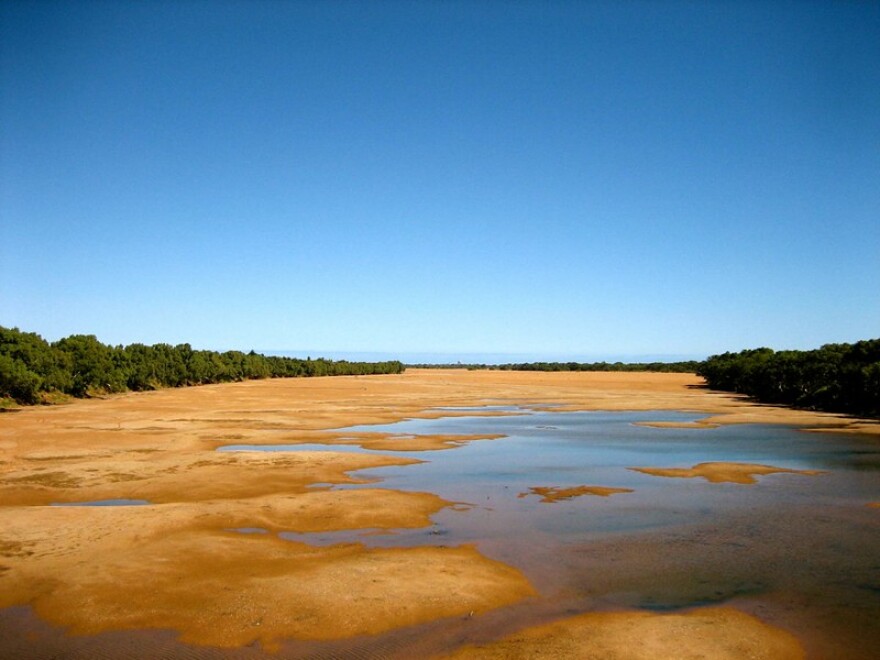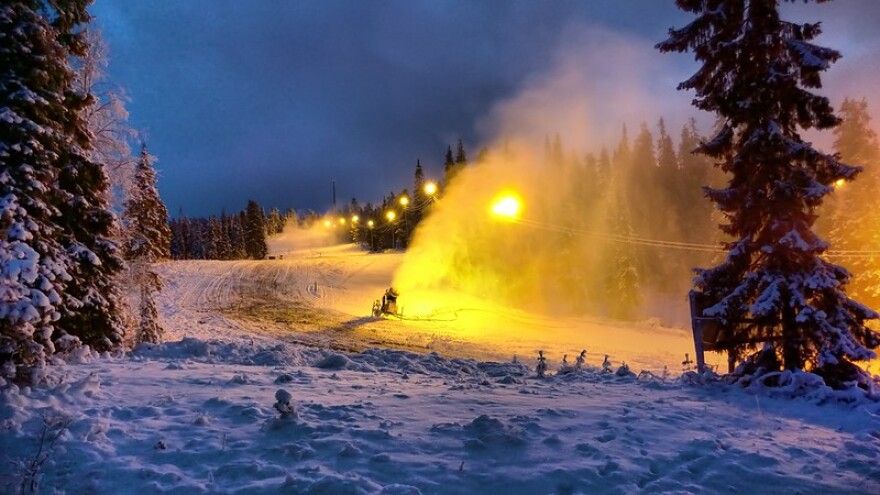Are snow-making machines an example of climate adaptation, or an example of an emissions feedback loop? Does the fire risk posed by planting trees outweigh the benefits of their use as a carbon sink? Can the team talk big planet problems and still leave room for bad puns?
We’ll answer these questions and more climate queries on this special edition of Ask Sam.
Editor's Note: We strongly recommend you listen to this story, where you can hear the answer to these questions discussed in more depth (and with more jokes).
Melissa from Santa Rosa, California, asks: "Hi Sam... I was listening to your episode on The Carrington Event, and you said something really fast that brought up a lot of questions in my mind... "megadroughts". I was wondering, is the United States doing anything to prepare for a megadrought?"
In some places, the answer is: yes. A megadrought is a dry period that lasts at least a decade, and by that definition some areas in the western United States currently qualify (even though there was a wet year recently, megadroughts are not broken by a single wet year). We also know from tree ring data that there have been several megadroughts in the past millennium - so they may be a little more common than the name might indicate.
Still, anthropogenic climate change is making drought conditions worse - and that's especially concerning, because a lot of water use policy was implemented during the 1800s, during a historic wet period.

But here's the good news: Areas of the country that have been in megadraught or close to megadrought conditions have used different tools to keep water running. In Austin, Texas, which only recently saw the end of an eight year drought cycle, planners have been setting up efficiency programs that target old water fixtures, and wastewater recycling efforts that clean up sewage and distribute it for non-drinking uses. Now folks like Marisa Flores Gonzalez at Austin Water are investigating ways of recharging underground aquifers during wet years to keep in reserve for future droughts.
"It's kind of like decision trees," Gonzalez says. "Decision trees kind of tell you, if you reach this point go - if you don't reach this point don't go, and tell you which pathways you should be following."
Ben from Clarksville, MD, asks: A question about "Renewable Energy Certificates", sometimes known by their acronym RECs. Are these intangibles helping actuate the pivot to a decarbonized energy world, or are they a hindrance?
It depends how you look at it. RECs are generated when renewable energy is generated, and can be sold to utilities who need to meet renewable energy mandates, or folks looking to burnish their environmental cred. In essence, they operate as a market-based subsidy. They're used as an important accounting tool to show that utilities are complying with renewable energy laws (called "Renewable Portfolio Standards") that obligate them to produce a certain amount of renewable energy. (Here in NH, we're working towards 25% by 2025. A recent bill that would have increased that percentage and created new target dates was recently vetoed by Governor Sununu.)
However, RECs can also be purchased by companies or people who want to look green, but aren't investing in more direct ways of reducing their footprint. Jigar Shah, cofounder of Generate Capital and cohost of The Energy Gang podcast, says, "There are people who will reach out to you via email and say 'if you feel terrible about your carbon footprint, I have some RECs to sell you - and I'll charge you the low price of $39.99 a month, and you will have all that guilt wiped away."
Ultimately, RECs can't be ruled simply as either a help, or a hindrance - they're a tool. RECs have been an important part of the renewable economy - but buying them isn't as valuable for the transition to renewable energy as actually building more renewable energy. And as the question-asker may suspect, some REC purchases have been accused of being corporate greenwashing.

Rachel from Denver, CO, asks: There's a lot of conflicting information regarding trees and climate change. I've planted a few trees here and there, but I do know that trees can pose fire dangers. So I'm wondering, although they eat a lot of carbon, is it really a good idea for people who live in urban areas and more rural areas to rely on planting trees to help combat climate change?
Even out West, planting trees can provide a valuable carbon sink. Fire ecologist S. Yoshi Maezumi says, "Deforestation is not the answer to stopping the wildfire crisis, and yes - having trees and managed forests are definitely going to sequester carbon."
A key word here is managed. In urban and suburban settings, the wildfire fuel associated with trees is most concerning when trees get overgrown and shrubby, and dropped branches are allowed to pile up. So planting trees is good - but managing them and planting them intelligently is key.
Blaine from Minneapolis, Minnesota, asks: I'm an avid cross country skier, and something that's been bugging me is the environmental impact of man-made snow... What does it do to the water quality, how much electricity are we using, where is the electricity coming from? By making snow are we part of the solution, or part of the problem?
While snow-making does use water and electricity, it's unlikely that ski operations (downhill and cross-country) account for much in the way of overall emissions. But while they may not be a priority for cutting carbon, they are symbolic of the tensions that exist between two visions of a low carbon future.

Snow-making is climate adaptation at its most obvious: Places that used to get lots of snow are getting less of it, so companies figure how to make more. But should they? Some people see high-tech solutions (which tend to require more energy) as being part of the problem - other people think that the solution to climate change will require technical adaptations, and that people aren't likely to feel good about a future that requires dramatic lifestyle change. Should you stop driving - or get an electric car? These are tensions within the environmental movement around which reasonable people can disagree, and snow-making is a perfect illustration.







